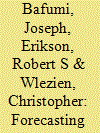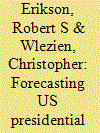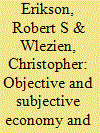|
|
|
Sort Order |
|
|
|
Items / Page
|
|
|
|
|
|
|
| Srl | Item |
| 1 |
ID:
090907


|
|
|
|
|
| Publication |
2009.
|
| Summary/Abstract |
Why did Obama defeat McCain in 2008? As with any national election outcome, the immediate culprit that comes to mind is economic performance. When the U.S. is prosperous, the electorate votes the incumbent presidential party back into office. When the U.S. economy sours, the incumbent (or incumbent party) loses. In 2008, the application of this rule led to a correct prediction once again. Economy up, Republicans out. It is difficult to challenge this conventional wisdom that the economy contributed to the transfer of the White House from the Republicans to Democrat Obama.
|
|
|
|
|
|
|
|
|
|
|
|
|
|
|
|
| 2 |
ID:
110527


|
|
|
|
|
| Publication |
2011.
|
| Summary/Abstract |
The 1969 Vietnam draft lottery assigned numbers to birth dates in order to determine which young men would be called to fight in Vietnam. We exploit this natural experiment to examine how draft vulnerability influenced political attitudes. Data are from the Political Socialization Panel Study, which surveyed high school seniors from the class of 1965 before and after the national draft lottery was instituted. Males holding low lottery numbers became more antiwar, more liberal, and more Democratic in their voting compared to those whose high numbers protected them from the draft. They were also more likely than those with safe numbers to abandon the party identification that they had held as teenagers. Trace effects are found in reinterviews from the 1990s. Draft number effects exceed those for preadult party identification and are not mediated by military service. The results show how profoundly political attitudes can be transformed when public policies directly affect citizens' lives.
|
|
|
|
|
|
|
|
|
|
|
|
|
|
|
|
| 3 |
ID:
100777


|
|
|
|
|
| Publication |
2010.
|
| Summary/Abstract |
In this article, we present a forecast of the 2010 midterm House election based on information available in early July 2010. We combine this forecast with a note of caution, explaining why electoral circumstances might lead our forecast to err. Finally, we present guidance regarding how to update the electoral forecast for 2010 based on new information that will become available leading up to Election Day.
|
|
|
|
|
|
|
|
|
|
|
|
|
|
|
|
| 4 |
ID:
177217


|
|
|
| 5 |
ID:
149328


|
|
|
| 6 |
ID:
131656


|
|
|
| 7 |
ID:
134791


|
|
|
|
|
| Summary/Abstract |
This article presents a forecast of the 2014 midterm House election based on information available four to six months in advance. The approach builds on our forecasts of the 2006 (Bafumi, Erikson, and Wlezien 2008) and 2010 (Bafumi, Erikson, and Wlezien 2010a,b) midterm elections. 1 We incorporate information about the national forces at work in the election, which are evident early in the election year from generic congressional polls plus the party of the president. We also incorporate information about the districts themselves, which is reflected in their partisan predispositions and in other ways, most notably, whether the incumbent seeks reelection. To forecast the 2014 election, we simulate the national vote and district outcomes using the past as our laboratory, details about which we provide in the text that follows.
|
|
|
|
|
|
|
|
|
|
|
|
|
|
|
|
| 8 |
ID:
116456


|
|
|
|
|
| Publication |
2012.
|
| Summary/Abstract |
The importance of the economy in US presidential elections is well established. Voters reward or punish incumbent party candidates based on the state of the economy. The electorate focuses particularly on economic change, not the level of the economy per se, and pays more attention to late-arriving change than earlier change. On these points there is a good amount of scholarly agreement (see e.g., Erikson and Wlezien 1996; Hibbs 1987). There is less agreement, however, on what specific indicators matter to voters. Some scholars rely on income growth, others on GDP growth, and yet others on subjective perceptions (see Abramowitz 2008; Campbell 2008; Holbrook 1996b; also see Campbell and Garand 2000). In our work, we have used the index of leading economic indicators, a composite of ten variables, including the University of Michigan's index of consumer expectations, stock prices, and eight other objective indicators.
|
|
|
|
|
|
|
|
|
|
|
|
|
|
|
|
| 9 |
ID:
121023


|
|
|
|
|
| Publication |
2012.
|
| Summary/Abstract |
My book "The Macro Polity," coauthored with Michael B. MacKuen and James A. Stimson and published in 2002, depicts the dynamics of public opinion and electoral politics in the United States at the macro level; the analysis is based on micro-level foundations of micro-level political behavior. This essay presents the book's main arguments, in some instances extending the analysis beyond its original 1956-1996 time frame to incorporate data from the George W. Bush administration. The central thesis is that there is more rationality and predictability to American politics when viewed in the aggregate than one might infer from considering only the limited political awareness of the average citizen.
|
|
|
|
|
|
|
|
|
|
|
|
|
|
|
|
|
|
|
|
|